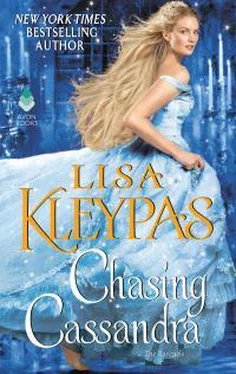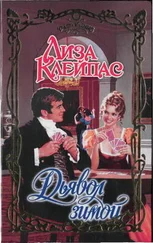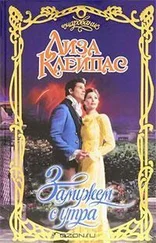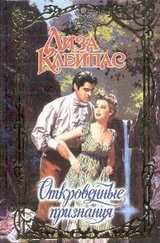Now seated at his desk, Severin broke the wax seal and hesitated unaccountably before unfolding the letter. His gaze moved swiftly over the written lines. One of his hands came up to rub his lower jaw slowly as he read it over again.
The black head lowered, as if Severin were overcome by illness . . . or emotion, which for Severin amounted to the same thing . . . and Barnaby was tempted to panic. Dear God, what was happening? What terrible news did the letter contain? But then Barnaby realized with a little shock that Severin had bent to press his lips to the scented parchment.
“Barnaby,” came his employer’s unsteady voice. “Clear my schedule for the rest of the week.”
“The entire week? Starting tomorrow?”
“Starting right now. I have preparations to make.”
Unable to stop himself, Barnaby asked hesitantly, “What has happened, sir?”
Severin grinned, a flush climbing in his fair complexion. His eyes were an intense blaze of blue-green. Such an apparent extremity of excitement was not at all normal for the man, and it made Barnaby nervous. “Nothing to worry about. I’ll be occupied with negotiations.”
“More to do with the Chronicle ?”
Severin shook his head. “Another business entirely.” A brief, wondering laugh escaped him. “The merger of a lifetime.”
Chapter 19
At eight o’clock in the morning, Tom arrived at Ravenel House, dressed in a beautiful dark suit of clothes with a royal-blue four-in-hand necktie. As he entered the breakfast room and bowed, he was so obviously pleased with the entire situation that even West was moved to reluctant amusement.
“I expected you to look like the cat who swallowed a canary,” West said, standing to shake Tom’s hand, “but you look more like a cat who swallowed another entire cat.”
At Kathleen’s invitation, Tom went to the sideboard and helped himself to coffee from a silver urn. He took the unoccupied chair between Cassandra and Phoebe. “Good morning,” he murmured.
Cassandra could hardly meet his gaze. She felt ridiculously shy and giddy, and embarrassed by the memory of their intimacy . . . those deep, consuming kisses . . . the wicked exploration of his fingers . . .
“Good morning,” she replied, and quickly took refuge in her tea. She was vaguely aware of the conversation taking place around her, a few pleasantries, and a tentative question from Phoebe about where he and Cassandra would take up residence after the wedding.
“The betrothal isn’t official yet,” Tom replied seriously. “Not until Cassandra is satisfied with the outcome of our negotiations.”
“But assuming you’ll reach an agreement . . . ?” Phoebe pressed.
“At the moment,” Tom said, looking at Cassandra, “I live at Hyde Park Square. We could live in that one if you like it. But it would be an easy matter to move to one of the others, if you would prefer.”
Cassandra blinked in confusion. “You have more than one house?”
“Four,” Tom replied in a matter-of-fact tone. Seeing her expression, he appeared to realize how odd she found it, and continued more cautiously, “I also have a few undeveloped residential lots in Kensington and Hammersmith, and recently I acquired an estate in Edmonton. But it would be impractical to live that far from my offices. So . . . I thought I might turn that one into a town.”
“You’re going to start a town?” Kathleen asked blankly.
“For the love of God,” West said, “don’t name it after yourself.”
A vaguely uneasy feeling crept over Cassandra. “Why do you have so many houses?” she asked Tom.
“Sometimes when a freehold property comes on the market at a decent price, I’ll buy it as an investment.”
“The London Ironstone railway isn’t your only source of income, then,” Cassandra said, trying to make sense of it. “You also deal in real estate.”
“Yes, and I do some speculative building here and there.”
“How many businesses do you have?” she asked.
Registering the keenly interested gazes focused on him, Tom asked uncomfortably, “Aren’t we supposed to refrain from discussing this at the breakfast table?”
“You never follow the rules,” Cassandra reminded him.
His reluctance was obvious. However, being Tom, he answered honestly. “I’ve grouped several companies with London Ironstone to form a conglomerate. Freight, steel and concrete production, factories that make hydraulic pumps, dredging and excavating equipment, an engineering and design firm, and so on. When I build a new railway line, I don’t need to hire outside contractors, I use my own. I also have service companies for maintenance, communications and signaling, safety equipment—” He paused as he saw the color drain from her face. “What’s the matter?”
“I just realized,” Cassandra said in a suffocated voice, “you don’t have a railway, you have an empire.”
“That’s not how I think of it,” Tom said with a slight frown.
“No matter what word one uses . . . you must be nearly as rich as Mr. Winterborne.”
Tom devoted a great deal of attention to buttering his toast.
Reading into his silence, Cassandra asked apprehensively, “Are you richer than Mr. Winterborne?”
“There are many different ways to calculate wealth,” Tom said evasively, reaching for a pot of jam.
Her stomach sank. “Oh, God, how much richer?”
“Why must I be compared to Winterborne?” Tom parried. “He does well at his business, and so do I. Let’s leave it at that.”
Devon replied to Cassandra in a matter-of-fact tone. “The two aren’t really comparable. Although Winterborne is a dominating force in commerce, Severin’s business affects everything : transportation, trade, manufacturing, communications, and urban development. He’s not only changing the way business is done, but how and where people live.” Devon stared at Tom speculatively as he continued. “My guess is, Severin’s fortune is half again as much as Winterborne’s, and before long will be approximately double.”
Tom gave him an oblique glance, but didn’t deny it.
“I see,” Cassandra said sickly, thinking of her quiet, cozy life in the country, with dogs and gardens and relaxed afternoon walks.
“You won’t be burdened by my business affairs,” Tom told her, his brows lowering. “All of that will be kept separate from my home life.”
“The question is,” Devon said quietly, “how much home life will there be? You’re only one man, Tom, doing the work of at least ten—and the demands on you will only grow worse over time.”
“That’s for me to worry about.”
West spoke then, making no effort to hide his concern. “I’d say it’s for your future wife to worry about.”
Tom’s eyes narrowed. “Whatever my wife needs or desires of me,” he said with cool arrogance, “she’ll have it. I can arrange my schedule in any way I wish. I do as little or as much work as I want, go wherever I please, and stay or leave as it suits me. No one owns me or my time. That’s the point of being me.”
Ordinarily, Devon or West would have said something mocking in reply, but they were both silent. Something in Tom’s face communicated that he’d been pushed far enough. For the first time, Cassandra had an inkling of how he must appear to other people: someone to be respected and even feared. A man who possessed vast power and authority, and was entirely comfortable wielding it. This was a side he rarely, if ever, revealed to the Ravenels. He’d always been willing to tolerate a few jabs and teasing from his friends with good grace . . . but he didn’t have to.
In fact, there was very little Tom Severin had to tolerate.
He would be nearly impossible to manage, Cassandra thought apprehensively. One might as well try to harness a storm. But he’d brought himself to confess he needed her, which had been extraordinarily difficult for him. That wasn’t a guarantee of anything . . . but it wasn’t a bad start.
Читать дальше












